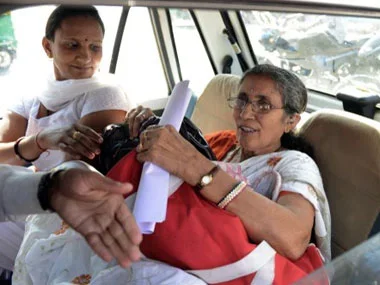Information from the first interview by Vakil in 1993.
"The self-confessed strong man doesn't deserve any sympathy for inviting attacks, personal or political, but the facts of Modi's child marriage is more of a tragedy than a scandal that his critics are portraying," says Vikram Vakil, a Surat-based senior journalist who first scooped Modi's marriage way back in 1993 for the Gujarati political weekly Abhiyaan I had founded.
"Vakil, otherwise a staunch critic of Modi, defends him on this count. "Modi's marriage was an accident of destiny. It was a kind of a Shakespearean tragedy where neither the man nor woman can be blamed. Both can be judged as right or wrong. It depends on what is your premise to judge him and her. The external factor worked against them when their lives were not in their hands."
Vakil, in 1993, secured the first interview with Jashodaben.
"Then, she had expressed her one-way devotion to Modi and even her stubborn and highly orthodox streak," remembers Vakil.
She told Vakil that she would not agree to a divorce. In the early 1990s, she said, when she heard on the radio that Modi had been sacked as the BJP's general secretary, she went on a fast and consumed only water for six days to pray for him.
Once she even got to see Modi for a few seconds, says Vakil. "She had gone to Maninagar in Ahmedabad, when she saw Modi going by on a two-wheeler. She immediately left his path so as to not embarrass him."
Those who know Modi in Gujarat, says Vakil, have argued for many years that he never maintained any relations with his wife, with whom he did not have a conventional married life.
Jashodaben has also confessed that she never had any relations with her husband. "So what's the fuss all about?" asks Vakil.
When the story revealing Modi's marital status was published in 1993, Vakil recalls he received flak from the Rashtriya Swayamsevak Sangh and Vishwa Hindu Parishad leaders based in Gujarat. The RSS has known of Modi's martial status all along, Vakil insists.
Modi never had any loving relationship with his wife. It was not a case of him 'abandoning' a marriage, which did not exist in real life. Modi, on his part, never confined Jashodaben to the marriage, says his friend of many decades in Ahmedabad.
Jashodaben, a highly conservative woman who understandably, by the social standards of India of the 1960s, opted to remain confined to the marriage instead of kicking Modi out from her life for not starting the marriage in the real sense.
She could have got a divorce and married again, at a later stage, when Indian society was changing and urbanisation had impacted social values. In spite of media pressure, if she does not speak against Modi, it suggests that Modi has not ill-treated her or exploited her after parting ways, says Modi's Gujarati friend.
"Any criteria you apply -- orthodox or liberal -- in this particular case, Modi will win the round only because in matters of love we Indians know ishq par zor nahi (love brooks no pressure)," he says, summing up the predicament of his friend who wants to become prime minister.
"The option of divorce she always had before her, but she wanted to remain devoted to Modi. It was a one way relationship that she opted for. Even when she became economically independent, she preferred to remain alone but married nominally," says Vakil. "I think we should respect Jashodaben for the choice of life she has chosen to live, and we must see reason in Modi's stand."

